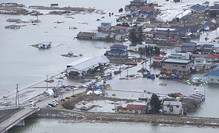 Credit: Attribution Some rights reserved by Official U.S. Navy Imagery
Credit: Attribution Some rights reserved by Official U.S. Navy Imagery Speaking at the media140 conference in Barcelona, Madrid, who is a journalist for 24 hour news channel 3/24, said examples from the German media in particular, showed a difference in coverage based on the newspaper's views on the domestic use of nuclear energy.
During his presentation, in which he highlighted examples of what he considered scaremongering across the non-Japanese press, he added that despite many journalists not being "fully prepared" to speak about topics such as nuclear energy, they still did.
"I'd say the majority of journalists are not trained with knowledge about nuclear energy and still we were daring enough to make statements about this."
And even when they had sufficient information, "they didn't do anything about it", he added.
"On Sunday 14 [March] there was a second explosion in another nuclear reactor and the media all broadcast a last minute story, 'new nuclear panic', but seven hours had gone by and it had been a false alarm. But because of this enormous delay we made the mistake of giving the wrong information."
"We have turned a country into an object for our own profession," he said.
"We have transformed Japan as something distant instead of remembering that there are 25,000 casualties and devastation to a country to be rebuilt."
On the other hand the Japanese media, part of the "victim society" rather than the "observing society", felt they were offering a public service, he said.
"They were trying to make that very clear as part of their discourse ... it is very ingrained into the minds of Japanese media … In a nutshell European media had a very sensational point of view, Japanese media had a very minimalistic point of view, watering it down."
Fellow panel member Guillermo Martinez Taberner, assistant professor at Universitat Pompeu Fabra, also felt media coverage of the crisis was distorted, and as a result, the information conveyed.
"Communication outlets started talking about what was closest to us – the nuclear crisis – we could speak about it, it could be on TV, linked to our domestic policies, so we forgot what was going on and started talking about the nuclear context only.
"There was a polarisation of what the European media were talking about on one side and the Japanese media on the other."
Image by Official US Navy Imagery on Flickr, some rights reserved
Free daily newsletter
If you like our news and feature articles, you can sign up to receive our free daily (Mon-Fri) email newsletter (mobile friendly).
Related articles
- Webinars and chatbots: inside Nikkei's B2B subscription strategy
- How news organisations in Asia-Pacific are getting readers to pay attention
- #editors13: Leadership lessons from covering the Christchurch earthquake
- Huffington Post launches Japanese edition
- 'We are better journalists when we empathise'









